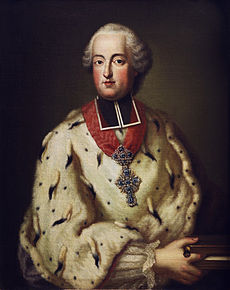Clemens Wenceslaus of Saxony
| Clemens Wenceslaus | |||||
|---|---|---|---|---|---|
| Archbishop-Elector of Trier | |||||
 |
|||||
| Reign | 1768–1803 | ||||
| Born |
28 September 1739 Hubertusburg castle, Wermsdorf |
||||
| Died | 27 July 1812 (aged 72) Marktoberdorf, Allgäu |
||||
|
|||||
| House | House of Wettin | ||||
| Father | Augustus III of Poland | ||||
| Mother | Maria Josepha of Austria | ||||
| Religion | Roman Catholicism | ||||
| Full name | |
|---|---|
| Clemens Wenzeslaus August Hubertus Franz Xaver |
Prince Clemens Wenceslaus of Saxony (German: Clemens Wenzeslaus August Hubertus Franz Xaver von Sachsen) (28 September 1739 – 27 July 1812) was a German prince from the House of Wettin and the Archbishop-Elector of Trier from 1768 until 1803, the Prince-Bishop of Freising from 1763 until 1768, the Prince-Bishop of Regensburg from 1763 until 1769, and the Prince-Bishop of Augsburg from 1768 until 1812.
Clemens Wenceslaus was the ninth child of the Prince-Elector Augustus III of Saxony, who was also the King of Poland. In 1760 he went to Vienna and entered the Austrian army as a field marshal. He was present at the Battle of Torgau (3 November 1760), but he decided that warfare was not for him and instead entered the church. On 18 and 27 April 1763 he was elected the Bishops of Freising and Regensburg, respectively, but he abandoned these dioceses for the Archbishopric-Electorate of Trier and the Prince-Bishopric of Augsburg in February and August 1768, respectively, where he already functioned as coadjutor since 1764.
As Archbishop-Elector, Clemens Wenceslaus greatly improved public education, established several not-for-proft organisations for general education and prosperity, and in 1783 raised an edict of tolerance. He took a mixed view in spiritual affairs. He allowed the Jesuits to remain in Trier after abolishing their order, protested the radical reforms of his cousin, the Emperor Joseph II, and banned several processions and holidays. Although a modest person who lived simply, he rebuilt Ehrenbreitstein into a magnificent palace and dwelt there. He established the theatre in Coblenz and encouraged music in the archdiocese. Clemens Wenceslaus enjoyed hunting and established a hunting lodge at Kärlich, though he was opposed to several inhumane ways of hunting.
...
Wikipedia
